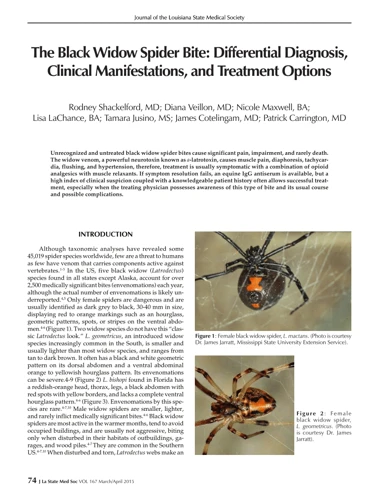As we go about our daily lives, we often come across different creatures, some harmless, while others pose a threat to our well-being. Black Widow spiders are known to cause fatal bites due to their venomous nature. These spiders primarily reside in North America and are more common in warmer regions. Given their potency, it is important to be knowledgeable about the symptoms of a black widow spider bite, how to prevent them, and what to do in case of an emergency. In this article, we will discuss in detail the physical characteristics, habitat, bite mechanisms of black widow spiders, and the cases of death resulting from their bites. Additionally, we will provide tips and guidance on how to avoid black widow spiders and the best ways to treat a black widow bite if you find yourself in a worst-case scenario.
What are Black Widow Spiders?
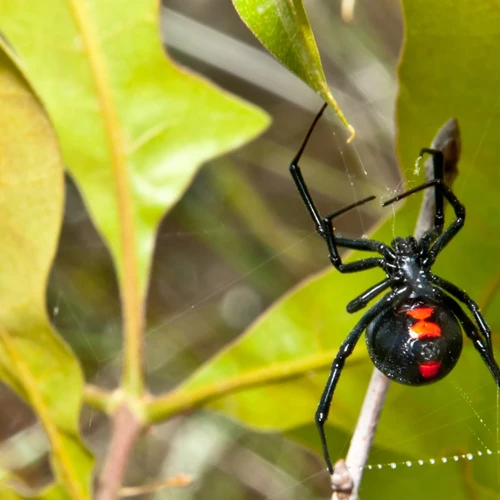
Black Widow spiders are notorious for their venomous bites and have become a subject of fear for many people. These spiders are often recognized by the iconic red hourglass shape on their abdomen. Black Widow spiders belong to the genus Latrodectus, which includes 32 species distributed globally. They are known for their potent venom that can cause serious health problems and even death in some cases. Additionally, Black Widow spiders have a fascinating life cycle, venom chemistry, and evolutionary history that makes them an intriguing topic of study. Various aspects of Black Widow spiders will be explored in detail in the following sections.
Physical Characteristics
Black widow spiders are known for their distinctive physical features, which make them instantly recognizable to most people. Below is a table that highlights some of the key physical characteristics of black widow spiders:
| Color: | Black with a distinctive red hourglass marking on the underside of the abdomen |
| Size: | Adult females are typically around 1.5 inches in length, including legs. Males are smaller and less venomous |
| Shape: | Black widow spiders have a round, bulbous abdomen and a slender, tapering cephalothorax (head and thorax) |
| Webs: | Black widow spiders build webs that are irregular in shape and often found in dark, sheltered areas such as woodpiles, sheds, and basements |
It is important to note that the physical characteristics of black widow spiders can vary slightly depending on the species and geographical location. However, the red hourglass marking on the underside of the abdomen is a defining feature that is present in most species.
While black widow spiders may appear intimidating, it is important to remember that they only bite in self-defense and are generally not aggressive towards humans. Nevertheless, it is important to take precautions to avoid getting bitten, as their venom can be extremely dangerous (see black widow venom chemistry and black widow distribution for more information).
Location and Habitat
Black Widow Spiders are predominantly found in warmer regions like the southern US, Mexico and South America. They usually prefer dry, dark and secluded habitats like under rocks, logs, and in bushes. They are known to build their strong and sticky webs close to the ground. These spiders are often found in barns and outhouses.
Black Widows are not aggressive and will only bite to defend themselves. These spiders are known to bite when they feel threatened or when they are disturbed and trapped. They are more active during the night but can also be found during the day when they venture out to look for prey.
It is important to note that Black Widows can be found almost anywhere – from houses to gardens to the wild. They are common in woodpiles, attics, basements, and sheds. They can easily adapt to new locations, especially to environments with a high population of insects for food.
When outdoors, it is important to steer clear of areas where Black Widows are likely to hide. Avoid walking barefoot outside, especially in areas with a lot of vegetation. Wear protective clothing like gloves and boots when working in gardens, woodpiles or areas with accumulated clutter.
Combatting the presence of Black Widow Spiders in and around the house is essential. Getting rid of clutter, sealing cracks, and gaps in windows and doors, and removing webs with a broom and dustpan are effective ways to keep Black Widows away from the house. Be sure to perform regular checks in your house to identify any spiders and their webs.
Visit (internal link) for more tips on how to avoid Black Widow Spider bites in the house and garden.
How Do Black Widow Spiders Bite?
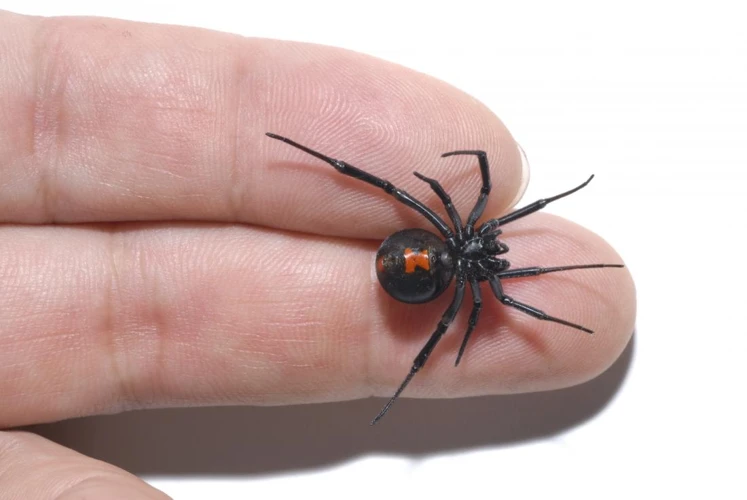
Black widow spiders are notorious for their venomous bite, which can cause serious health problems, especially in vulnerable individuals like children or the elderly. But how exactly do these spiders bite? What happens when they inject venom into their prey or a human? This is what we will explore in this section, looking at the physical mechanics of the black widow spider bite and the symptoms that can arise. To understand the full impact of a black widow spider bite, we will also provide a link to more information on the medical importance of their venom.
Symptoms of a Black Widow Spider Bite
Black Widow spider bites are usually painless at first but become painful within a few hours. The bite may go unnoticed, especially if the spider only grazed the victim’s skin. The symptoms of a Black Widow spider bite may include:
- Sharp pain or stinging sensation: The victim may feel a sharp pain or stinging sensation instantly or within a few hours.
- Redness and swelling: A red spot typically appears at the site of the bite, and surrounding area may become swollen within a few hours.
- Muscle cramps and spasms: Severe muscle cramps and spasms can develop within just a few hours, usually starting in the stomach, back, and chest. These symptoms can last for days or even weeks. In severe cases, muscle spasms can cause respiratory difficulties.
- Sweating and chills: Fever, chills, and sweating may occur, along with a sense of apprehension or anxiety. The victim may feel restless and irritable.
- Headache and dizziness: The victim may experience a headache, dizziness, or even fainting. These symptoms are more common in children and the elderly.
- Nausea and vomiting: Nausea and vomiting may occur, especially in children.
It’s important to note that the symptoms of a Black Widow spider bite can vary widely depending on the age and health of the victim, as well as the amount of venom injected. In some cases, a Black Widow spider bite may cause serious complications such as seizures, coma, or even death. If you suspect that you or someone you know has been bitten by a Black Widow spider, seek medical attention immediately. There are interesting articles about brain effects of Black Widow venom and medical importance of Black Widow venom that may provide more insight into the effects of this venom on humans.
What Happens in a Black Widow Spider Bite?
Once bitten by a black widow spider, venom containing a neurotoxin spreads throughout the body. In the first few hours, the bitten person may not experience symptoms, but after that, they can experience severe muscle pain and cramps. The symptoms can spread to the entire body, and the person may experience hypertension or high blood pressure, nausea, vomiting, abdominal pain, and/or difficulty breathing. The pain, usually concentrated in the abdomen, can spread to the legs, back, and chest.
The venom injected by the black widow spider is very potent and targets the nervous system. The neurotoxic proteins in the venom cause the release of neurotransmitters that lead to muscle spasms and cramps. The bite can be fatal, especially in vulnerable individuals such as children, older adults, or individuals who have a weakened immune system. Immediate medical attention is necessary if you are bitten by a black widow spider.
In severe cases, the victim may experience seizures or worse, a coma. The venom also weakens the immune system, making the affected person more susceptible to other infections. The neurotoxic venom can cause muscle paralysis if left untreated. The symptoms can last for several days, with some duration up to 10 days. Severe cases can lead to death, as the venom has the ability to disrupt the normal functioning of the body’s organs.
As you can see, it’s essential to seek medical attention as soon as possible after a black widow spider bite. If left untreated, the venom can lead to serious consequences or even death. It is also important to monitor the affected person and be aware of the symptoms which can be treated with antivenom. Strong painkillers may also help to alleviate some of the pain.
Cases of Death due to Black Widow Spider Bite
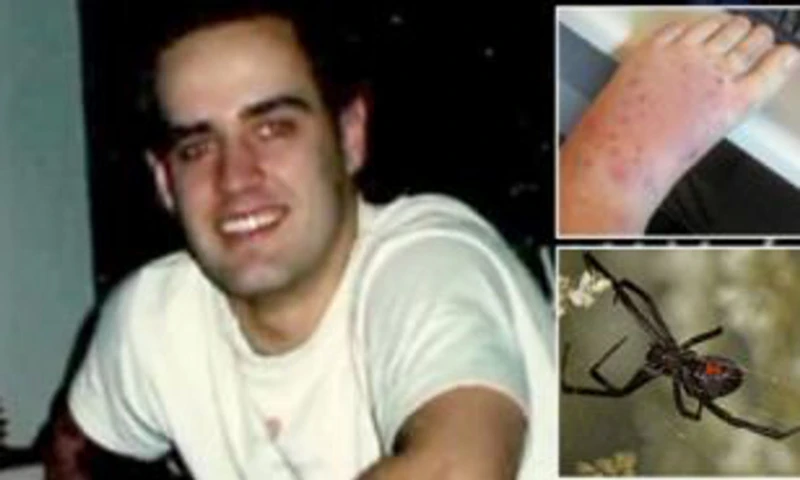
The black widow spider bite can be dangerous and even fatal in some cases. In this section, we will examine some documented cases where victims unfortunately succumbed to the potent venom of the black widow spider. It is important to note that while these cases are rare, they highlight the potential danger of these spiders. Let’s dive into three case studies of death by black widow spider bite that occurred in the United States.
Case Study 1: Death by Black Widow Spider Bite in California
In California, a 32-year-old man died due to a black widow spider bite. According to the reports, the man was bitten while doing yard work that involved moving yard debris. The man, not realizing he had been bitten, continued to work for several hours before his symptoms became noticeable. Unfortunately, by the time he sought medical attention, it was too late, and he passed away from the effects of the venom.
Here are some key takeaways from this tragic case:
- Black widow spiders are commonly found in California, and individuals should be cautious when working or spending time outdoors.
- Symptoms of a black widow spider bite can take some time to appear, and it is important to seek medical attention if you suspect that you have been bitten.
- Black widow spider bites can cause severe reactions and even death, highlighting the importance of understanding how to prevent and treat these bites.
To learn more about the immune system’s response to black widow spider bites, check out “How Black Widow Spider Bites Affect the Immune System”. Additionally, if you’re interested in the life cycle of black widow spiders and their venom, read “The Evolutionary Significance of Black Widow Spider Venom and Life Cycle.”
Case Study 2: Fatal Black Widow Spider Bite in Florida
In Florida, a fatal black widow spider bite case was reported, increasing concerns about the dangerous effects of the venomous black widow spider bites. The incident involved a 60-year-old woman who was working in her garden when she was bitten. The woman reportedly felt an intense pain in her leg, followed by muscle cramps and abdominal pain. She was shortly taken to the hospital but died within hours of the bite.
Black widow spider venom is known to be one of the most potent and potentially lethal toxins of all spider species. The venom of black widow spider contains a neurotoxin that attacks the central nervous system of the victim. The toxins may cause severe pain, muscle weakness, and abdominal cramping. The venomous toxins found in the black widow spider have evolved over time to paralyze and kill their prey.
Although black widow spiders are not aggressive, they will bite humans if they feel threatened. In the case of the woman in Florida, the spider may have felt threatened by her movements while she was gardening, leading to the attacking bite.
It is essential to take immediate medical action upon being bitten by a black widow spider. The venom can cause severe and life-threatening symptoms, and a delay in treatment can prove to be fatal, as seen in the case of the woman from Florida. Seeking a medical professional’s help can help prevent the venom from spreading through the body, leading to potentially fatal systemic symptoms.
To avoid suffering from the painful and potentially lethal symptoms of black widow spider bites, it’s important to take necessary precautions while moving around in areas where black widow spiders may dwell, mainly in dark and quiet areas. It’s also advisable to wear protective clothing and avoid reaching into dark, enclosed spaces or handling firewood or debris without gloves.
However, in the case of fatal black widow spider bites, medical professionals must act quickly by administering anti-venom therapy to the patient. This treatment will help counteract the effects of the potent neurotoxins and prevent further damage to the victim’s body.
It is crucial to take black widow spider bites seriously and immediately seek medical attention to avoid experiencing severe and even fatal symptoms caused by black widow spider venom.
Learn more about the pain caused by black widow spider venom
Case Study 3: Death of a 4-year old boy in Texas
A heartbreaking incident happened in Texas when a 4-year-old boy passed away due to a Black Widow spider bite. The incident took place during a normal afternoon when the young boy was playing outside in the backyard of his family’s house. Unfortunately, he encountered a Black Widow spider which had made its way to the boy’s toys. The spider’s venom quickly took effect, causing severe pain and muscle stiffness throughout the boy’s body.
According to reports, the boy’s family immediately took him to the hospital after they noticed something was wrong. However, with the severity of the venom’s effects, the hospital staff could not provide adequate treatment to save his life. The young boy passed away within hours of the incident.
This tragic case shows just how dangerous Black Widow spiders can be, even to young and healthy individuals. The potency of the venom in these spiders is enough to cause severe symptoms and, in some cases, fatal outcomes.
It is vital to take measures to avoid encounters with Black Widow spiders. While they can be challenging to identify as they dwell in dark, undisturbed areas, they are most commonly found in dry, warm regions such as Texas. In any outdoor activity, it would be best to take extra precautions to avoid potential encounters with Black Widow spiders.
Prevention is key. By taking responsible measures and educating oneself, it is possible to decrease the risk of Black Widow spider bites. For more information on the evolutionary aspect of Black Widow spider venom, please see our article on evolutionary BW spider venom. For more general facts and information about venomous bites from Black Widow spiders, see our article on venomous bite Black Widow facts.
Prevention of Black Widow Spider Bites
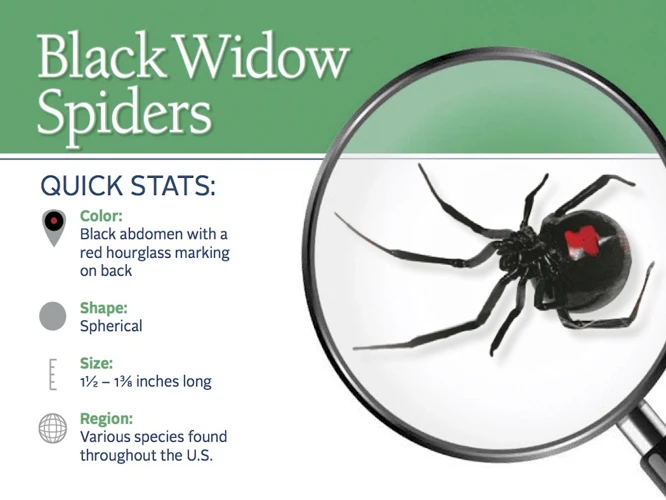
When it comes to venomous spiders, Black Widow spiders are one of the most dangerous and feared. Due to their aggressive nature, it is important to take preventive measures to avoid getting bitten. In this section, we will discuss some practical tips to help you avoid Black Widow spiders and minimize your risk of getting bitten. By following these tips, you can enjoy outdoor activities and keep yourself and your loved ones safe from these venomous spiders.
How to avoid Black Widow Spiders
One of the best ways to avoid black widow spiders is to eliminate their habitat and make your residence spider-proof. Here is a table that outlines some actions you can take to avoid black widow spiders:
| Action | Description |
| Eliminate hiding places | Seal cracks and crevices around your residence, dispose of clutter, and store firewood at least 20 feet away from your residence. |
| Clean regularly | Keep your residence clean and tidy by vacuuming, sweeping and wiping surfaces regularly. |
| Use insecticide | Use insecticides on black widow spiders’ habitats, but be aware that insecticides can harm non-target species. |
| Wear protective clothing | Wear gloves, long-sleeved shirts, pants, and boots when performing outdoor activities such as gardening or yard work. |
| Check items before bringing inside | Inspect any items outdoors before bringing them inside, such as gardening gloves, shoes, and toys that may have been left outside. |
By taking these preventative measures, you can minimize the risk of encountering black widow spiders, reducing the likelihood of being bitten.
Precautions during outdoor activities
When spending time outdoors, it’s important to take precautions to avoid encountering Black Widow Spiders. Here are some tips to stay safe:
- Wear protective clothing such as long-sleeved shirts, pants, and gloves to minimize skin exposure.
- Check your surroundings before sitting down or placing your hands on any surface, especially if it’s been undisturbed for a long time.
- Shake out any clothing or gear that has been stored outside before using it.
- Avoid walking barefoot or in sandals while in areas where Black Widow Spiders are known to live.
- Do not leave food out or litter around your camping area, as this can attract other insects and create a breeding ground for spiders.
- Use insect repellent on exposed skin to keep insects, including spiders, at bay.
- Take care when clearing foliage or debris, as Black Widow Spiders often hide in these types of materials.
Remember, the best way to stay safe is to be aware of your surroundings and take the necessary precautions to avoid coming into contact with Black Widow Spiders. While they may not usually be aggressive, a bite can be extremely dangerous and even fatal in some cases.
Treatment of Black Widow Spider Bites
When it comes to treating black widow spider bites, time is of the essence. These bites can be extremely dangerous and potentially life-threatening if not treated promptly and correctly. In this section, we will explore the various medical treatments available for black widow spider bites and what steps you can take at home to alleviate symptoms and aid in your recovery. So, let’s dive into the details on how to properly treat a black widow spider bite.
Medical Treatment
When seeking medical attention for a black widow spider bite, it is important to seek prompt treatment. The faster you receive medical treatment, the better your chances of recovery.
Medical treatment for black widow spider bites typically involves the use of antivenom, which is a medication that can neutralize the spider venom and stop the symptoms from getting worse. Antivenom is typically only used in severe cases of black widow spider bites, as it can come with side effects and risks.
In addition to antivenom, healthcare providers may use pain relief medications to help manage the discomfort associated with a black widow spider bite. This may include over-the-counter pain relievers like ibuprofen or acetaminophen, or prescription-strength medications like opioids.
It is important to note that if you experience symptoms like difficulty breathing, muscle cramps, or severe pain after a black widow spider bite, you should seek emergency medical treatment immediately. These symptoms could be a sign of a severe reaction to the spider venom, and require prompt medical attention.
Below is a list of some possible medical treatments for black widow spider bites:
- Antivenom therapy
- Pain medication
- Symptomatic treatment
It is important to follow your healthcare provider’s instructions for treatment and monitoring after a black widow spider bite, and to report any new or worsening symptoms promptly. With prompt and proper medical attention, most people make a full recovery after a black widow spider bite.
What you can do at home
If you find yourself bitten by a Black Widow spider, seeking medical treatment should be your top priority. However, there are a few things you can do at home to ease the pain and reduce the risk of complications. Here are some steps you can take at home:
| Step | Description |
|---|---|
| Step 1: | Wash the affected area with soap and water. |
| Step 2: | Apply a cool compress to the bite. This can help reduce swelling and relieve pain. |
| Step 3: | Elevate the affected limb to reduce swelling. |
| Step 4: | Take over-the-counter pain medication, such as ibuprofen or acetaminophen, to help relieve pain. |
| Step 5: | Drink plenty of fluids to stay hydrated. |
| Step 6: | Monitor your symptoms closely and seek medical attention if they worsen or if you experience any difficulty breathing. |
It’s important to note that while these steps can help alleviate some of the immediate symptoms of a Black Widow spider bite, they are not a substitute for medical treatment. If you have been bitten by a Black Widow spider, seek medical attention immediately.
Conclusion
After examining the cases of death caused by black widow spider bites and the ways to prevent and treat such bites, it is clear that while black widow spiders are venomous and their bites can be fatal, they are not an extremely common cause of death.
It is important to note that the majority of people who are bitten by black widow spiders, survive. However, it is crucial to take necessary precautions when living or spending time in areas where black widow spiders are present. This includes wearing protective clothing, shaking out clothing and shoes before wearing them, and avoiding dark and cluttered places.
In the unfortunate event of a black widow spider bite, it is crucial to seek medical attention immediately. Antivenom is available, but it is typically administered in severe cases or cases where there are additional health concerns. It is essential to stay calm and get medical help as soon as possible.
In conclusion, it is essential to be aware of the dangers of black widow spiders and to take precautions to avoid their bites. While they can cause death in rare cases, most people who are bitten by black widow spiders will survive and can receive medical treatment to help alleviate symptoms. By understanding how to prevent and treat black widow spider bites, we can better protect ourselves and loved ones from this potentially dangerous arachnid.
Frequently Asked Questions
What should I do if I think I have been bitten by a black widow spider?
If you suspect that you have been bitten by a black widow spider, seek medical attention immediately.
What is the mortality rate for black widow spider bites?
The mortality rate for black widow spider bites is less than 1%, but it can be higher in children and elderly populations.
Are black widows aggressive towards humans?
No, black widows are not aggressive towards humans. They will only bite if they feel threatened or provoked.
Can black widow spiders be found in urban areas?
Yes, black widow spiders can be found in urban areas, particularly in warm climates and areas with lots of vegetation.
Are there any natural predators of black widow spiders?
Yes, some natural predators of black widow spiders include birds, lizards, and wasps.
What is the difference between a male and female black widow spider?
The female black widow spider is larger than the male and has a distinctive red hourglass shape on its abdomen. The male has smaller and less striking markings.
Can black widow spiders live indoors?
Yes, black widow spiders can live indoors. They may enter buildings in search of food or shelter.
Are all species of black widow spiders venomous?
No, not all species of black widow spiders are venomous. Only a few species, including the North American black widow and the Australian redback, produce venom that can be dangerous to humans.
Can black widow spider venom be used for medical purposes?
Yes, black widow spider venom has been used to develop pain medications and muscle relaxants.
Can black widow spider bites cause permanent damage?
In rare cases, black widow spider bites can cause long-term muscle damage or other complications, particularly in children and the elderly.

